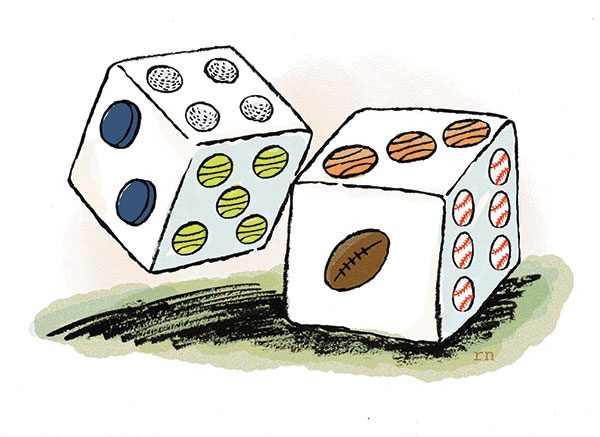
I’ve become increasingly conflicted regarding the issue of legal sports betting in New Jersey.
As I’ve written in New Jersey Monthly, I grew up in a neighborhood in Newark where illegal sports betting was the norm. Our fathers would bet on professional sports on a regular basis, whether they had the money or not. It’s hard to forget that many dads on Sundays would either parlay their winnings from the first game of a double header to the next, or double down on the second game after losing the first. Either way, they were rarely big winners, and their innocent families were the losers.
Usually on Monday things started to get really ugly, with more middle-aged guys in my neighborhood than I’d like to remember struggling to figure out how they were not only going to pay back the bet, but the “vig” (an administrative percentage to be paid on top of the bet just for being able to make the bet). It was all very organized, but the government was never involved.
In high school, countless kids were involved in passing around football tickets. I’m not talking tickets to games, but tickets that were a buck or two apiece that allowed you to pick winners in all kinds of games—especially football. Often you had to win virtually every game to win a percentage of the total pool.
For certain kids, it became a very big deal and a very big business. For some of those kids, as well as some adults in the neighborhood, an occasional law-enforcement professional would step in, and the illegal gambling would stop. Some folks would even face serious financial penalties; for the really big-time bookies there might be jail time.
And while some of those illegal sports-betting activities still go on, there is a big push to make sports betting legal in New Jersey. According to a recent Fairleigh Dickinson University PublicMind poll, 53 percent of New Jerseyans support allowing sports betting at Atlantic City casinos as well as at whatever horse tracks are left. Only 30 percent of those polled opposed sports betting, while 17 percent were undecided.
There is a referendum to legalize sports betting in New Jersey on the ballot in November. Even if it passes, the existing federal ban on sports betting (which applies to every state except Delaware, Nevada, Oregon and Montana) would have to be overturned in court for you to make a legal sports bet in our state. In March, a lawsuit filed by state senator Raymond Lesniak to overturn the ban was dismissed in federal court because the voters had not yet spoken.
Awhile back I wrote about the Lottery’s Powerball game, asking if this is really the way we want to raise revenue in New Jersey. I’ve long argued that these lotteries prey on those who can least afford them, and that policy makers should be more responsible by raising taxes on those who have the greatest ability to pay. But now is the time to face some cold hard facts.
There won’t be a millionaire’s tax anytime soon in New Jersey. The governor has made it clear he simply won’t sign it. The gas tax isn’t going up, and, whether it makes sense or not, we are going to keep giving out property tax rebates. Simply put, these are drastic times, and I’ve come to realize that they call for drastic fiscal measures.
I say, roll the dice. Let’s make sports gambling legal. True, people who can least afford it will be drawn into the vortex, worsening economic and social stress. But the alternative of creating no new significant revenue streams is even worse, because more and more state programs that help the poor and working class are going to be slashed in order to balance the state budget. Just wishing that a policy like a millionaire’s tax gets implemented isn’t a strategy; it’s simply wishful thinking.
Legalizing sports betting is real—very real. It’s going to pass in November, and there is a decent chance the federal ban can be overturned, too. When and if legalization passes, the state needs to set up meaningful regulatory and administrative structures that protect the integrity of the process. There should also be a means to encourage those who can’t afford it or those who are addicted to gambling to sit on the sidelines. Government can’t actually mandate it, but an aggressive public-service program in this regard is warranted.
It may sound hypocritical for me to take this position after expressing so many reservations about expanding the state’s reliance on gambling. But I’m convinced that there are few, if any, other alternatives for the foreseeable future. I only hope that the state can be as organized and efficient in managing sports betting as those who handled it in my old neighborhood in Newark (without the loan sharks and collectors).
